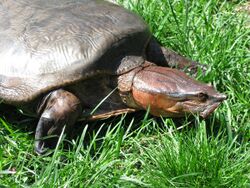Biology:Aubry's flapshell turtle
From HandWiki
Short description: Species of turtle
| Aubry's flapshell turtle | |
|---|---|

| |
| Scientific classification | |
| Domain: | Eukaryota |
| Kingdom: | Animalia |
| Phylum: | Chordata |
| Class: | Reptilia |
| Order: | Testudines |
| Suborder: | Cryptodira |
| Family: | Trionychidae |
| Genus: | Cycloderma |
| Species: | C. aubryi
|
| Binomial name | |
| Cycloderma aubryi (A.H.A. Duméril, 1856)[3]
| |
| Synonyms[4] | |
| |
Aubry's flapshell turtle (Cycloderma aubryi)[5] is a species of softshell turtle in the family Trionychidae. The species is endemic to Central Africa.
Etymology
The specific name, aubryi, is in honor of Charles Eugène Aubry-Lecomte (1821–1879), who was a French civil servant and an amateur naturalist.[6]
Geographic range
C. aubryi is found in the Democratic Republic of Congo, Gabon, the Cabinda Province of Angola and likely in the Central African Republic.[7]
Habitat
The preferred natural habitats of C. aubryi are forest and freshwater wetlands, at altitudes up to 500 m (1,600 ft).[1]
Diet
Adults of C. aubryi prey upon crabs, crayfish, and fish. Juveniles may also eat insects.[1]
Conservation status
In 2017, the IUCN listed C. aubryi as vulnerable.[1]
References
- ↑ 1.0 1.1 1.2 1.3 Chirio, L.; Diagne, T.; Pauwels, O.S.G. (2017). "Cycloderma aubryi". IUCN Red List of Threatened Species 2017: e.T163448A1009393. doi:10.2305/IUCN.UK.2017-3.RLTS.T163448A1009393.en. https://www.iucnredlist.org/species/163448/1009393. Retrieved 18 November 2021.
- ↑ "Appendices | CITES". https://cites.org/eng/app/appendices.php.
- ↑ Rhodin, Anders G.J.; van Dijk, Peter Paul; Iverson, John B.; Shaffer, H. Bradley (2010-12-14). "Turtles of the world, 2010 update: Annotated checklist of taxonomy, synonymy, distribution and conservation status". Chelonian Research Monographs 5: 000.124. doi:10.3854/crm.5.000.checklist.v3.2010. Archived from the original on 2011-07-17. https://web.archive.org/web/20110717125632/http://www.iucn-tftsg.org/wp-content/uploads/file/Accounts/crm_5_000_checklist_v3_2010.pdf.
- ↑ Fritz, Uwe; Havaš, Peter (2007). "Checklist of Chelonians of the World". Vertebrate Zoology 57 (2): 313–314. ISSN 1864-5755. Archived from the original on 2011-05-01. https://web.archive.org/web/20110501060224/http://www.cnah.org/pdf_files/851.pdf. Retrieved 29 May 2012.
- ↑ Animaldiversity.umich.edu
- ↑ Beolens, Bo; Watkins, Michael; Grayson, Michael (2011). The Eponym Dictionary of Reptiles. Baltimore: Johns Hopkins University Press. xiii + 296 pp. ISBN:978-1-4214-0135-5. (Cycloderma aubryi, p. 12).
- ↑ JCVI.org
Further reading
- Bour R (2008). "The holotypes of Pentonyx gabonensis A. Duméril, 1856 and Cryptopodus aubryi A. Duméril, 1856". Emys 15 (3): 41–44.
- Broadley DG (1998). "The reptilian fauna of the Democratic Republic of the Congo (Congo-Kinshasa)". In: Schmidt KP, Noble GK (1998). Contributions to the Herpetology of the Belgian Congo... [reprint of the 1919 and 1923 papers]. SSAR Facsimile reprints in Herpetology, pp. 780.
- Chirio, Laurent; Ineich, Ivan (2006). "Biogeography of the reptiles of the Central African Republic". African Journal of Herpetology 55 (1): 23–59.
- Duméril AHA (1856). "Note sur les reptiles du Gabon ". Revue et Magasin de Zoologie Pure et Appliquée, Paris [Second Series] 8 : 369–377, 417–424, 460–470, 553–562. (in French).
- Ernst CH, Barbour RW (1989). Turtles of the World. London and Washington, District of Columbia: Smithsonian Institution Press.
- Gramentz, Dieter (1998). "Zur Morphologie und Merkmalsvariation von Cycloderma aubryi. (Duméril, 1856) ". Salamandra 34 (4): 333–348. (in German).
- Gray JE (1860). "On the African Trionyces with hidden feet (Emyda)". Ann. Mag. Nat. Hist. 6 (3): 440–441.
- Günther A (1896). "Report on a collection of reptiles and fishes made by Miss M. H. Kingsley during her travels on the Ogowe river and in Old Calabar". Ann. Mag. Nat. Hist. 17 (6): 261–267.
- McCord WP, Joseph-Ouni M (2003). "Chelonian Illustrations #6. Flapshell and Giant Asian Softshell Turtles". Reptilia (Great Britain) (26): 59–64.
- Meylan PA(1987). "The phylogenetic relationships of soft-shelled turtles (Family Trionychidae)". Bull. Amer. Mus. Nat. Hist. 186 (1): 1–101.
- Nieden F (1910). "Die Reptilien (ausser der Schlangen) und Amphibien ". In: Die Fauna der deutschen Kolonien. Reihe 1. Kamerun Heft 2. Berlin. pp. 75. (in German).
- Pauwels OSG, Vandeweghe JP (2008). Les reptiles du Gabon. Washington, District of Columbia: Smithsonian Institution. 272 pp. (in French).
- Pauwels OSG; Branch, William R.; Burger, Marius (2004). "Reptiles of Loango National Park, OGOOUÉ-MARITIME PROVINCE, SOUTH-WESTERN GABON". Hamadryad 29 (1): 115–127.
- Tornier G (1902). "Die Crocodile, Schildkröten und Eidechsen in Kamerun ". Zool. Jahrb., Abt. Syst. 15 (6): 663–677. (in German).
- Valverde J (2007). "Weichschildkröten ". Reptilia (Münster) 12 (6): 16–23. (in German).
External links
Wikidata ☰ Q2476966 entry
 |


